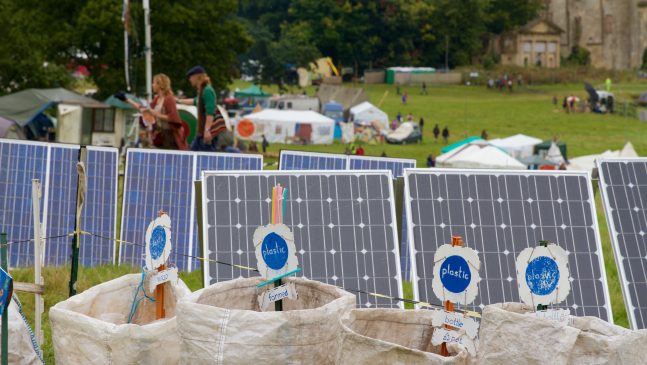Engaging the community in using renewables
The Green Gathering is a festival with an environmental and social justice focus; it has workshops and talks on permaculture, politics, ecology and crafts, as well as art, live music and spoken word performances. It currently has a capacity of 5,000 and takes place in Chepstow, Monmouthshire.
The Green Gathering is proudly run on 100% renewable energy solutions. Throughout the years the organisers have faced and overcome many challenges in producing a festival with no generators. Many of the solutions to problems in this area have come from successfully engaging their community of audience, traders and suppliers in a shared commitment to operating sustainably.
To providing lighting for the festival without using generators they switched to 100% LED lighting throughout, which was a bigger challenge that it sounds due to an initial lack of suppliers of relevant products. Over the years they have engaged suppliers to build up a list of companies who can step in to provide the right products in the right quantities onsite.
Wheelchair and mobility scooter charging using renewable technology was a challenge to overcome as The Green Gathering’s Assisted Access camping area filled up and demand grew. The festival implemented a number of solutions in 2014, ranging from bringing in extra solar power providers to communicating with the audience to inform them to arrive with batteries and spares fully charged, and by stipulating charging times. These measures were so successful that in 2015, The Green Gathering was able to extend its Assisted Access area further with confidence that the audience’s energy needs could be catered for.
“Informing and engaging customers is vital to keeping them on board and positive about running on renewables, especially if being ‘green’ means they can’t have exactly what they want when they want it!”
The Green Gathering requires traders to be 100% renewably powered, ethical and offer a quality product or menu. For traders who meet these criteria but usually run on mains electric, advice and information is on offer to help them go ‘off grid’. In some cases traders can be linked up with the festival’s regular renewable power providers who may, for a small charge (or free meals!) be able to provide the power needed. The festival’s Green Markets coordinator also provides information to cafes about low-energy equipment and menus if they are keen to make the switch to renewables.
“The Green Gathering community has a number of solar and LED experts who can advise traders to help them trade off grid not just for this event but at all events, so that everyone benefits in the longer term. It’s largely about engaging with the traders.”
The people who come together to create and co-ordinate the festival have built up rich resources of knowledge and are keen to share their skills and experience to benefit not only the festival but also the wider world, through empowering people to be environmentally responsible and resilient.
Many thanks to The Green Gathering for providing the information for this case study.
Website: greengathering.org.uk

